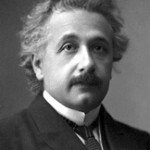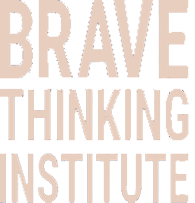Albert  Einstein (1879-1955) was born at Ulm, in Württemberg, Germany, on March 14, 1879. Six weeks later the family moved to Munich, where he later on began his schooling at the Luitpold Gymnasium. Later, they moved to Italy and Albert continued his education at Aarau, Switzerland
Einstein (1879-1955) was born at Ulm, in Württemberg, Germany, on March 14, 1879. Six weeks later the family moved to Munich, where he later on began his schooling at the Luitpold Gymnasium. Later, they moved to Italy and Albert continued his education at Aarau, Switzerland
and in 1896 he entered the Swiss Federal Polytechnic School in Zurich to be trained as a teacher in physics and mathematics. In 1901, the year he gained his diploma, he acquired Swiss citizenship and, as he was unable to find a teaching post, he accepted a position as technical assistant in the Swiss Patent Office. In 1905 he obtained his doctor’s degree.
During his stay at the Patent Office, and in his spare time, he produced much of his remarkable work and in 1908 he was appointed Privatdozent in Berne. In 1909 he became Professor Extraordinary at Zurich, in 1911 Professor of Theoretical Physics at Prague, returning to Zurich in the following year to fill a similar post. In 1914 he was appointed Director of the Kaiser Wilhelm Physical Institute and Professor in the University of Berlin. He became a German citizen in 1914 and remained in Berlin until 1933 when he renounced his citizenship for political reasons and emigrated to America to take the position of Professor of Theoretical Physics at Princeton*. He became a United States citizen in 1940 and retired from his post in 1945.
After World War II, Einstein was a leading figure in the World Government Movement, he was offered the Presidency of the State of Israel, which he declined, and he collaborated with Dr. Chaim Weizmann in establishing the Hebrew University of Jerusalem.
Einstein always appeared to have a clear view of the problems of physics and the determination to solve them. He had a strategy of his own and was able to visualize the main stages on the way to his goal. He regarded his major achievements as mere stepping-stones for the next advance.
At the start of his scientific work, Einstein realized the inadequacies of Newtonian mechanics and his special theory of relativity stemmed from an attempt to reconcile the laws of mechanics with the laws of the electromagnetic field. He dealt with classical problems of statistical mechanics and problems in which they were merged with quantum theory: this led to an explanation of the Brownian movement of molecules. He investigated the thermal properties of light with a low radiation density and his observations laid the foundation of the photon theory of light.
In his early days in Berlin, Einstein postulated that the correct interpretation of the special theory of relativity must also furnish a theory of gravitation and in 1916 he published his paper on the general theory of relativity. During this time he also contributed to the problems of the theory of radiation and statistical mechanics.
In the 1920’s, Einstein embarked on the construction of unified field theories, although he continued to work on the probabilistic interpretation of quantum theory, and he persevered with this work in America. He contributed to statistical mechanics by his development of the quantum theory of a monatomic gas and he has also accomplished valuable work in connection with atomic transition probabilities and relativistic cosmology.
After his retirement he continued to work towards the unification of the basic concepts of physics, taking the opposite approach, geometrisation, to the majority of physicists.
Einstein’s researches are, of course, well chronicled and his more important works include Special Theory of Relativity (1905), Relativity (English translations, 1920 and 1950), General Theory of Relativity (1916), Investigations on Theory of Brownian Movement (1926), and The Evolution of Physics (1938). Among his non-scientific works, About Zionism (1930), Why War? (1933), My Philosophy(1934), and Out of My Later Years (1950) are perhaps the most important.
Albert Einstein received honorary doctorate degrees in science, medicine and philosophy from many European and American universities. During the 1920’s he lectured in Europe, America and the Far East, and he was awarded Fellowships or Memberships of all the leading scientific academies throughout the world. He gained numerous awards in recognition of his work, including the Copley Medal of the Royal Society of London in 1925, and the Franklin Medal of the Franklin Institute in 1935.
Einstein’s gifts inevitably resulted in his dwelling much in intellectual solitude and, for relaxation, music played an important part in his life. He married Mileva Maric in 1903 and they had a daughter and two sons; their marriage was dissolved in 1919 and in the same year he married his cousin, Elsa Löwenthal, who died in 1936. He died on April 18, 1955 at Princeton, New Jersey.
General Theory of Relativity and Quantum Theory
With the turn of the 20th century, the field of physics underwent two major transformations, roughly at the same time. The first was Einstein’s General Theory of Relativity, which dealt with the universal realm of physics. The second was Quantum Theory, which proposed that energy exists as discrete packets—each called a “quantum.” This new branch of physics enabled scientists to describe the interaction between energy and matter down through the subatomic realm.
Einstein saw Quantum Theory as a means to describe Nature on an atomic level, but he doubted that it upheld “a useful basis for the whole of physics.” He thought that describing reality required firm predictions followed by direct observations. But individual quantum interactions cannot be observed directly, leaving quantum physicists no choice but to predict the probability that events will occur. Challenging Einstein, physicist Niels Bohr championed Quantum Theory. He argued that the mere act of indirectly observing the atomic realm changes the outcome of quantum interactions. According to Bohr, quantum predictions based on probability accurately describe reality.
Niels Bohr and Max Planck, two of the founding fathers of Quantum Theory, each received a Nobel Prize in Physics for their work on quanta. Einstein is considered the third founder of Quantum Theory because he described light as quanta in his theory of the Photoelectric Effect, for which he won the 1921 Nobel Prize. See more on www.nobelprize.org
Famous quotes of Albert Einstein
- “If you can’t explain it to a six year old, you don’t understand it yourself.”
- “Everybody is a genius. But if you judge a fish by its ability to climb a tree, it will live its whole life believing that it is stupid.”
- “Imagination is more important than knowledge.”
- “Peace cannot be kept by force. It can only be achieved by understanding.”
- “We can’t solve problems by using the same kind of thinking we used when we created them.”
- “Do not worry about your difficulties in mathematics. I can assure you mine are still greater.”
- “Not everything that counts can be counted, and not everything that can be counted counts.”
- “The only thing that interferes with my learning is my education.
- “Any intelligent fool can make things bigger, more complex, and more violent. It takes a touch of genius — and a lot of courage — to move in the opposite direction.”
- “Everything should be made as simple as possible, but not simpler.”
- “Great spirits have always found violent opposition from mediocrities. The latter cannot understand it when a man does not thoughtlessly submit to hereditary prejudices but honestly and courageously uses his intelligence
- “You never fail until you stop trying.”
- “The important thing is not to stop questioning. Curiosity has its own reason for existing.”
- “It is not that I’m so smart. But I stay with the questions much longer.”
- “Creativity is intelligence having fun.”
- “I have no special talents. I am only passionately curious.”
- “Great spirits have often encountered violent opposition from mediocre minds.”
- “Anyone who has never made a mistake has never tried anything new.”
- “Learn from yesterday, live for today, hope for tomorrow. The important thing is to not stop questioning.”
- “Life is like riding a bicycle. To keep your balance you must keep moving.”
- “The most beautiful thing we can experience is the mysterious. It is the source of all true art and all science. He to whom this emotion is a stranger, who can no longer pause to wonder and stand rapt in awe, is as good as dead: his eyes are closed.”
- “My religion consists of a humble admiration of the illimitable superior spirit who reveals himself in the slight details we are able to perceive with our frail and feeble mind.”
- “Whoever undertakes to set himself up as a judge of Truth and Knowledge is shipwrecked by the laughter of the gods.”
- “Science without religion is lame. Religion without science is blind.”
- “I want to know God’s thoughts; the rest are details.”
- “Human beings, vegetables, or cosmic dust, we all dance to a mysterious tune intoned in the distance by an invisible player.”
- “When the solution is simple, God is answering.”
- “Try not to be a person of success, but rather a person of virtue.”
- “We have to do the best we can. This is our sacred human responsibility.
- “Two things are infinite: the universe and human stupidity; and I’m not sure about the the universe.“
- “Once you can accept the universe as matter expanding into nothing that is something, wearing stripes with plaid comes easy.”
- “Gravitation is not responsible for people falling in love.”
- “The difference between genius and stupidity is; genius has its limits.”
- “When you are courting a nice girl an hour seems like a second. When you sit on a red-hot cinder a second seems like an hour. That’s relativity.”
- “Any man who can drive safely while kissing a pretty girl is simply not giving the kiss the attention it deserves.”
- “Reality is merely an illusion, albeit a very persistent one.”
- “As punishment for my contempt for authority, Fate has made me an authority myself.”
- “A clever person solves a problem. A wise person avoids it.”
- “The most aggravating thing about the younger generation is that I no longer belong to it.”
- “Insanity: doing the same thing over and over again and expecting different results”
From Nobel Lectures, Physics 1901-1921, Elsevier Publishing Company, Amsterdam, 1967





































